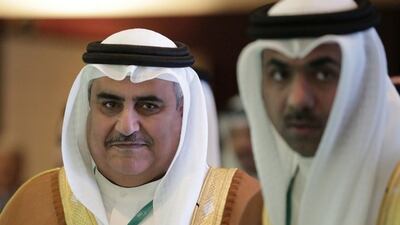ABU DHABI // Bahrain’s foreign minister accused Doha on Monday of seeking military escalation of the Gulf crisis just days after Turkey deployed additional troops to its base in Qatar,
"The foundation of the dispute with Qatar is diplomatic and security-oriented, never military," Sheikh Khalid bin Ahmed Al Khalifa said on Twitter. "Bringing in foreign armies and their armoured vehicles is the military escalation that Qatar has created."
The UAE, Saudi Arabia, Bahrain and Egypt have severed diplomatic ties with Doha as well as trade and travel links, and expelled Qatari citizens in the most serious internal crisis since the formation of the GCC. The countries accuse Qatar of supporting a range of Islamist and extremist groups, and seeking to undermine their security, charges that Doha denies.
The four Arab countries delivered a list of 13 demands aimed at the heart of Qatar’s foreign policies, including the closure of the permanent Turkish military base that opened last year. There were already around 100 troops deployed to the base, but Ankara accelerated plans to send more in the midst of the dispute.
Sheikh Tamim, the Qatari emir, has forged a close personal relationship with the Turkish president, and sent Qatari special forces to protect him after last summer’s coup attempt. Turkey is Qatar’s most closely-aligned strategic ally.
Qatar has leveraged its key role as a natural gas supplier to countries around the world, as well as its partnership with the United States to put pressure on Riyadh and its allies. But Turkey’s symbolic military deployment has been, for Gulf officials, one of the most provocative outside moves.
Five armoured vehicles and 23 military service members arrived in Doha on Thursday, according to Reuters, and Al Jazeera broadcast footage of them driving on open roads. The number of troops could reach 1,000 and there is the possibility of an air force deployment, according to Reuters.
Turkey’s defence minister, Fikri Isik, told local media last week that Ankara would not close the base.
Qatar already hosts the largest US military base in the region, which houses the forward headquarters of US Central Command, and is the most important element in its relationship with Washington.
Both Turkey and Saudi Arabia's regional rival Iran have stepped in to increase exports to Qatar of food as well as supplies to sustain Doha’s unrelenting pace of construction for the 2022 football World Cup.
Saudi and UAE ties with Turkey and Qatar frayed significantly after the 2011 Arab Spring, when the two countries supported Islamist movements across the region. But Saudi Arabia’s King Salman sought to mend relations and form a united front against Iran, which Turkey also considers a rival and has opposed in Syria.
Iran has relished the opportunity to drive a wedge between GCC members to weaken the bloc that was formed in 1981 in response to the Iranian revolution and the fears it sparked about Tehran's regional intentions.
On Sunday, Iranian president Hassan Rouhani called Sheikh Tamim and said the economic isolation of Qatar is "unacceptable” and that Tehran “stands with the Qatari nation and government”, according to Iranian state media.
Qatar, which shares the world’s largest natural gas field with Iran, is also accused by the Saudi Arabia-led group of countries of not backing Riyadh’s position on Iran, and one of their demands is a reduction in relations with Tehran.
Iran is happy to see a new front open in regional alignments "thereby shattering the display of GCC unity as well as expose Trump’s mismanagement of his regional relationships,” said Sanam Vakil, an associate fellow at Chatham House who studies GCC-Iran relations.
She said the dispute "provides Iran with short term political capital in terms of helping Qatar in a time of need and a long term playing card to keep up its sleeve should the regional fight impact Iran.”
foreign.desk@thenational.ae

